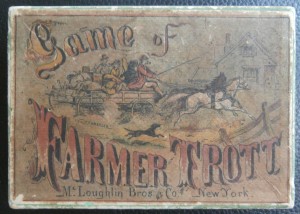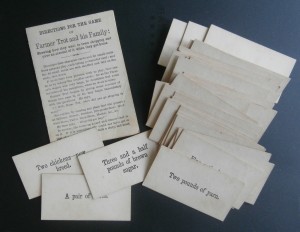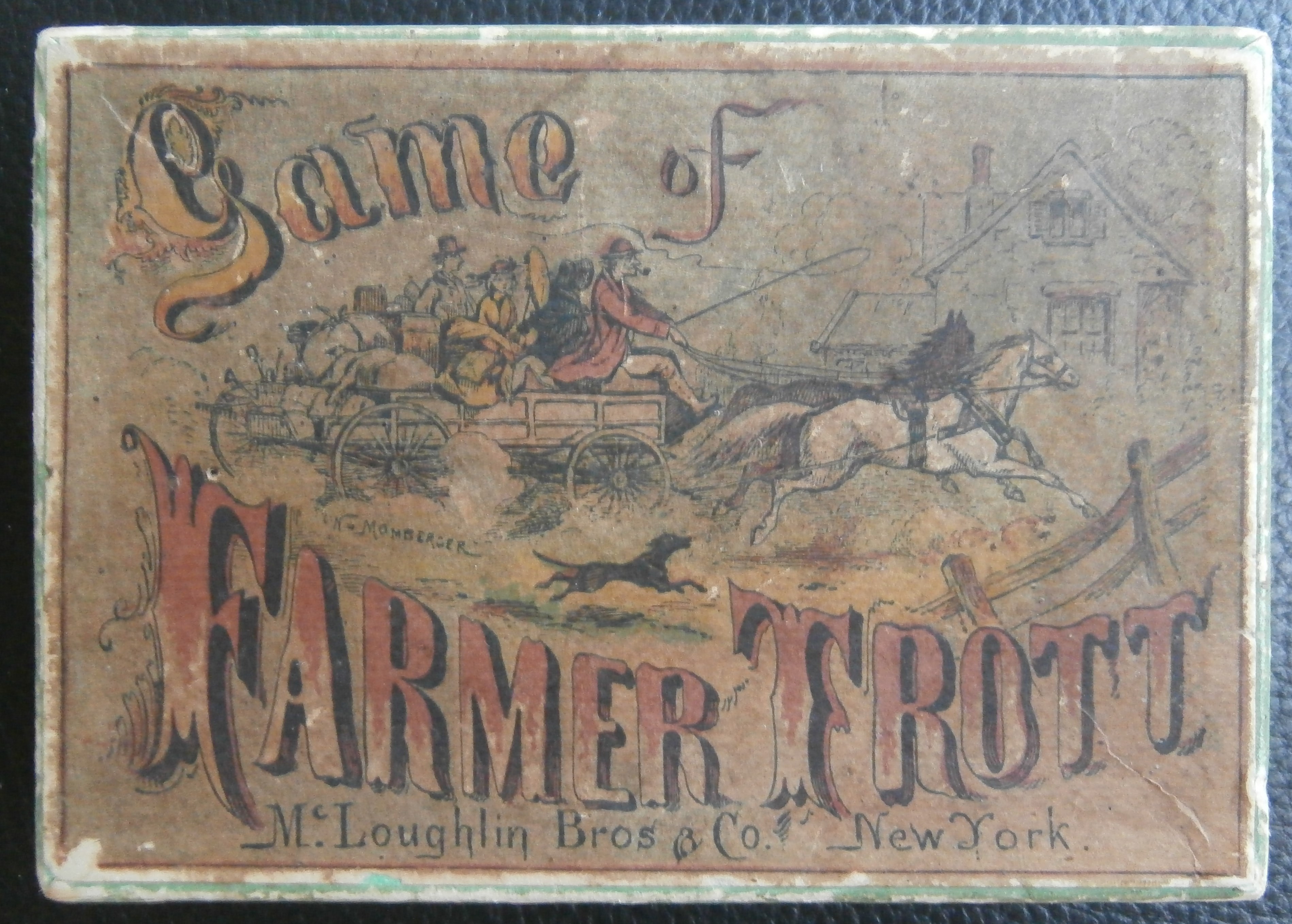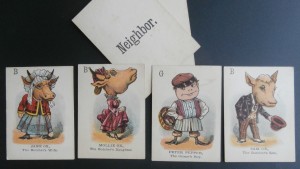 The old 1860’s Mcloughlin Bros. Game of Farmer Trott comes in a quaint 3×4 inch box. Under its now faded cover are 48 tiny cards, 4 character cards (and 2 extra ‘neighbor’ cards), and a small instruction booklet containing an enduring story. These items rest inside the aged container and wait to be played with.
The old 1860’s Mcloughlin Bros. Game of Farmer Trott comes in a quaint 3×4 inch box. Under its now faded cover are 48 tiny cards, 4 character cards (and 2 extra ‘neighbor’ cards), and a small instruction booklet containing an enduring story. These items rest inside the aged container and wait to be played with.
The box cover shows a family sitting in a wagon filled with packages. The game discloses they are returning back from town after enjoying a day of shopping. The tale, that sets the stage for the game, takes players of today back to a time of an almost forgotten age.
At the beginning of the game this tale is read by the dealer. It is as follows:
“I was starting off to town this morning very quietly in my one-horse shay, when out rushes Mistress Dame Trot.
“Oh Trot,” said she, “don’t go without me; I’ve got lots to buy today, and I must go!”
“Come along my dear,” said I. So I unhitched the horse and put him to the little wagon. “This will do for us, “ said I.
Just then out flies Sallie. “Oh father! Going to town, I must go, got heaps of things to buy!”
Just then out walks John-
“Father, I must go to town today. I want a good many things, and can’t get along without them.”
So I gave a groan and got out, and my Dame got out, and I took the big wagon and two horses; for I know when Wife and Sallie go to town shopping, not to mention John, it takes two strong horses to bring home all they buy. Their purse might fly back, like feathers on the wind, for never a cent is there left in them.
Now we are all home once more. I should like to know where you all went, and what you all bought. So, Dame Trot, where did you go shopping in town…….
and here begins the game.”
Each player takes a Character card. If more than 4 players, then the ‘neighbor’ cards are used, (because surely there was room in the wagon for any who wanted to go).
The 48 cards that have items written on them are placed face down in the center of players. An example of items on the cards are, A piece of beef, Two little pigs, A pound of candles, A bottle of hair oil, Two spools of cotton and other similar needs of the time to go shopping for.
 Three questions are asked to player on his turn.
Three questions are asked to player on his turn.
The first is ‘Where did you go shopping?’ The player answers with any place he wants. He could say ‘I want gone shopping at the Grocer, Butcher, Hardware Store, the Mill, or wherever’. After he answers, he is asked the second question, ‘What did you buy?’
This question prompts him to choose one center card. He reads it, and if he couldn’t have purchased the item at the store previously named, he is punished; unless, he can justify it. For example, if he says he went shopping at the Butcher Shop, surely he did not purchase Two pounds of Yarn there. However, he may come up with an explanation of how the Butcher’s Wife changed her mind on the color of yarn she had purchased earlier, and sold it to them instead of returning it to the store.
If all players agree with the explanation, he is not punished. The third question is now asked, ‘What do you intend to do with it?’ If the player cannot come up with a wise answer, then the player is punished for ‘extravagance’.
The winner is the first player who succeeds in plausibly answering all three questions. He now becomes Farmer Trott, and the game begins again.
Although players, trying to persuade other players of accepting their answers, were sure to be hilarious, the punishments for the game were just as entertaining. If players did not agree to answers given, players would have to tell a secret, tell who they liked most, dance, sing, cover his head with a handkerchief, and other humorous activities. These were the ‘punishments’.
Games of the past demonstrate how simple play brought families together. Time spent being creative and doing silly things together was thought to be a lot of fun. It’s nice to get these precious old games out, and play them today, for those same reasons.

